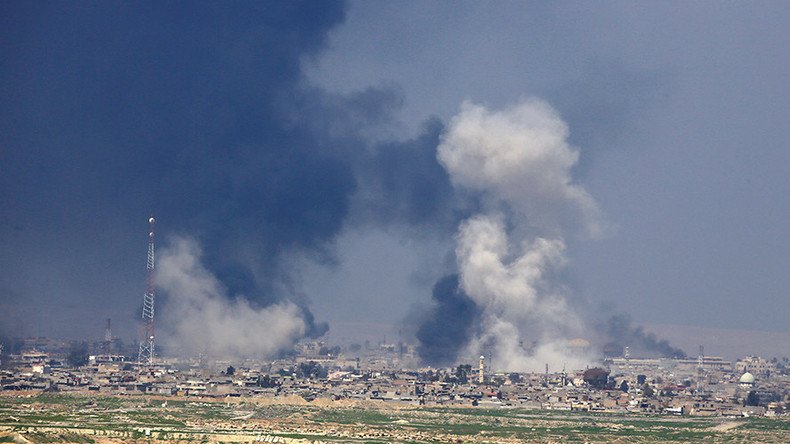Deadly Mosul bombing - ‘astronomic civilian casualties & several killed ISIS members’

Both the US and the Iraqi forces are in a way trying to disown the deadly incident in Mosul that resulted in the deaths of dozens of civilians, which indicates coordination on the ground is not perfect says Middle East expert Ammar Waqqaf.
US Central Command said an airstrike in Mosul on March 17 resulted in the deaths of dozens of civilians as it hit ISIS explosives and was carried out at the request of Iraqi forces. In turn, the Iraqi forces say there was no air strike at all rather, it was ISIS booby traps.
READ MORE: US confirms airstrike at site in Mosul where dozens of civilian casualties were reported
RT asked Ammar Waqqaf what this tells us about coordination on the ground.
Ammar Waqqaf: There is a bit of an element of everybody trying to disown this tragedy in a sense. But at the end of the day coordination on the ground might not be perfect. Whatever intelligence the Iraqi forces might have, this could have been indeed a request by the Iraqi forces saying that ‘we anticipate there is a bit of depot for explosives’ and so on, and so forth. And the US may have bombed it. As we understand from other reports coming after some sort of an investigation that there were only like six people, six ISIS …members at that particular neighborhood at that particular time. The number of civilian deaths – we’re talking about astronomical figures. If we were going to compare [it] with what happened in Syria, and the UN Security Council talking about the Syrian airplanes, and the Russian airplanes bombing Syria and bombing civilians, these are astronomical figures. These are not only in Mosul – we’ve had also an incident very recently in Raqqa – about ten days ago in which also hundreds of people were killed, when the US bombed a school in which displaced people were gathered, displaced families. So this is becoming something of a trend.
'Advise and Assist': US sends 200 more troops to support Mosul op - defense officials https://t.co/2yYUcjhZiC
— RT (@RT_com) 27 марта 2017 г.
.. If we were going to reduce civilian causalities to a minimum, this would require every single bit of intelligence that is available to anyone. And more coordination, not only with the forces that the US needs or prefers to coordinate with in the case of Mosul, for example, the Iraqi Army; in the case of Raqqa - Syrian Democratic Forces, or the Kurdish militia. They need to make sure that every bit of intelligence gathered by anyone is available to them. This would be eventually, hopefully, coordination by everyone who is fighting ISIS, fighting the same enemy.
RT:Is what we see here is the coalition and the Iraqi forces playing a blame game trying to pass the buck and blame each other for civilian casualties?
AW: As I said, very much so. Everybody would want to disown this particular tragedy, and everybody would want to blame the other side or some sort of a problem – either intelligence communication or pilot… At the end of the day, it is hard for one to understand that the Iraqi Army would give deliberate wrong information to the Americans. It is also not easy to understand or to think that the Americans have deliberately bombed civilians. The easiest way to think is that there has been a mistake. Now how to overcome this mistake – is by widening the net with which the US or the coalition gathers intelligence hopefully with other parties on the ground. Hopefully, that won’t happen again.
The statements, views and opinions expressed in this column are solely those of the author and do not necessarily represent those of RT.












